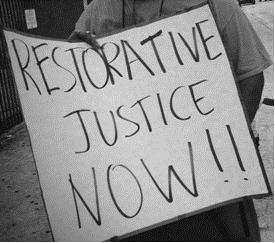Restorative Justice in Residential Care Homes






Addressing Offending by children in care
Evidence based practice suggests that intervention is required at many levels in dealing with troubled and troublesome young people
A restorative approach in a care setting shifts the emphasis from managing behaviour to focussing on the building, nurturing and repairing of relationships
Behaviour management policies tend to focus only on the behaviour of young people and usually include reference to sanctions in the event of rule breaking. These sanctions have the potential to harm the crucial adult-child relationship. A restorative care home needs, in contrast, a relationship management policy, which considers the needs and responsibilities of every member of that community towards each other.
Staff in Residential Child Care settings needs a range of flexible strategies for dealing with the day-to-day conflicts and challenges of living and working with young people 24/7.
The young people will learn how to deal with conflict and anger from the way in which the staff handle these situations. The behaviour of the adults will teach the young people key lessons in life for when they are faced with challenging situations - in work settings, socially with friends and as parents themselves.
Restorative justice is best regarded as being supplemental rather than substitutive. If we are committed to the view that what we do must be in the best interests of the child(ren) then we must be eclectic in our approach. However, while accepting that Restorative Justice is just one of the strategies used, I believe that the restorative approach is not only beneficial in and of itself but has additional benefits in that it calls for a fundamental change in the culture within the residential sector which makes life in care less stressful for young people.

Restorative Values and Principles
The key to dealing with all of these situations lies in keeping restorative values and principles in mind, remaining curious and open to the young person’s perspective, needs and feelings in any of these situations whilst also encouraging him or her to take responsibility for finding ways forward that take on board the needs of all those who are affected by the situation
Restorative values and principles imply a certain leadership style. The key to effective implementation of a restorative approach in care settings is to have the senior managers on board, fully trained and using these skills not only with the young people but also with staff. Two-day training programmes were developed and delivered to everyone who had daily and direct contact with the children - all management, residential and ancillary staff, including the cook.

Challenges
- With other ‘local’ children and between children and staff;
- Activity negotiation;
- Wanting to go out, without staff;
- Control/access to money, clothes, etc;
- Behaviour in transport / on journeys;
- When something in the home has been broken
- When there is an accusation of theft;
- Attempt at self-harm;
- Use of drugs and/or alcohol
- Welcoming young people or new staff into the setting;
- meeting with family; preparation for, and returning from visits; setting the group rules; getting
- Out of bed in the morning;
- Going to bed at night;
- Behaviour at school; meal times and in-between snacks;
- Rules around access and behaviour in the kitchen;
- Television times and what to watch;
- access to telephonesprivate calls;
- Conflict with other children in the home;

We offer training to teachers and pupils/students
Jane: 07736185029
Denis @ the office on 01162222629/07538706914
Home farm Centre Leicester, LE4 OSU
Email: info@rji.org.uk
Website; www.rji.org.uk
